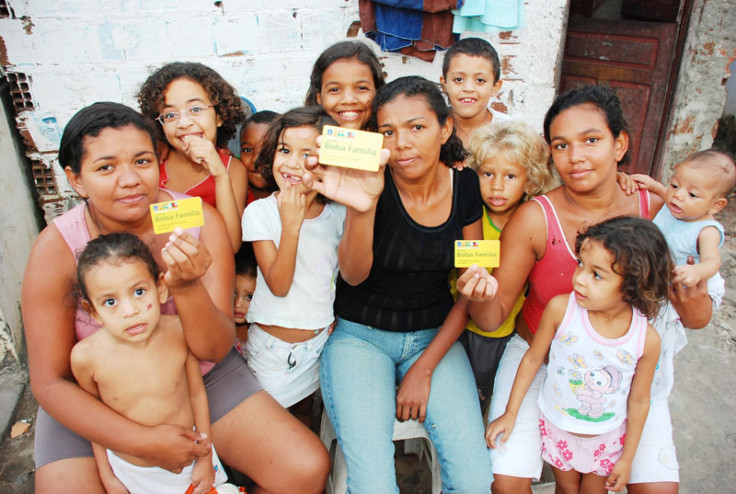Rumors Of Cancelled Welfare Spark Bank Run In Brazil; Is The Country Headed For A Credit Crunch?

Latin America's biggest economy saw a wave of panic on Saturday, over rumors that one of Brazil's social security programs was getting the ax. Customers of the well-known Bolsa Familia program, which helps more than 46 million low-income Brazilians, ran to local branches of the government-owned Caixa Econômica Federal (CEF) when reports appeared that the welfare initiative was set to be canceled, Jornal do Brasil reported.
The bank run turned into a frenzy when people, who can access their Bolsa Familia funds at the bank’s ATMs, destroyed nine branches of the bank in the northeastern party of the country, including in São Luis, capital of the state of Maranhão, according to São Paulo newspaper Estadão.
The Minister of Social Development began an inquiry, with the Brazilian federal police also opening an investigation on Monday, Brasilia newspaper O Globo noted.
“There is absolutely no possibility of payments being suspended or indeed any alteration to the normal timetable," said Minister for Social Development Tereza Campello in a statement over the weekend. "Bolsa Familia is being paid on time. And it’s being paid according to schedule."
Bolsa Familia was the flagship initiative of leftist former President Ignacio Lula da Silva, a social security program that has provided relief to over 13 million families in Brazil. Introduced in 2006, it devoted 0.5 percent of the country’s GDP and about 2.5 percent of total government expenditure to fight poverty, both short and long term.
The fund is open to families with children with a per-capita monthly income of less than 140 reais (approximately $70), giving them a stipend of 22 reais (about $12) a month per child. If the family makes half of that, the program gives them a flat amount of 68 reais ($32) a month. Conditions for receiving the funds are that every child in the family has to be vaccinated and go to school. Funds are readily available every month and accessible with a government-issued debit card from CEF ATMs.
Bolsa Familia has been called exemplary by the World Bank, and contributed to the reduction of poverty by 27.7 percent during Lula's first term between 2002 and 2006, as shown by Estadão.
The weekend panic seemed to be under control by Tuesday, but analysts warned that Brazil might be facing a credit crunch in the near future, and that any freeze of Bolsa Familia funds would not be to blame for it. Neal Shearing, chief emerging markets economist at research firm Capital Economics, told CNBC that an increase in credit has put the Latin American nation at a higher risk of a financial meltdown.
“[Credit] has increased very rapidly, and experience shows that countries where credit increases rapidly go into crisis at some point or another,” said Shearing.
The analyst said that banks in Brazil have been lending massively to the housing sector, which could lead to a housing bubble similar to the one that crushed the U.S. economy in 2008. “What we are seeing is credit-fueled growth starting to reach its limits -- it’s unsustainable,” he added.
Housing investment in Brazil has spiked in recent years, from 60 billion reais ($29 billion) in 2001 to 240 billion reais ($116 billion) in 2011, according to a study by Ernst & Young. Overall growth in the country has, however, slowed down, from 7.5 percent in 2010 to a projected rate of 3.2 percent in 2013, as reported by the Wall Street Journal.
Follow me on Twitter: @PReyMallen
© Copyright IBTimes 2024. All rights reserved.











